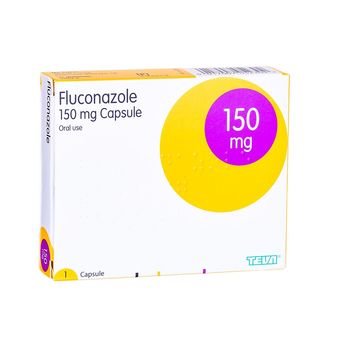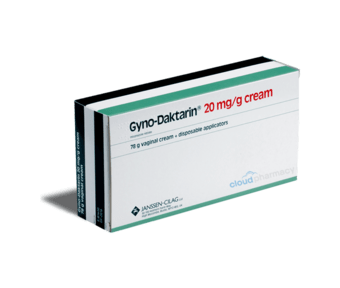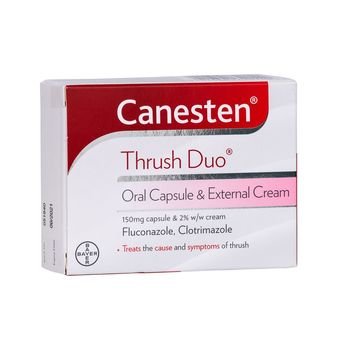Thrush

More information
Introduction
The frequency of thrush makes it important for the average person to understand the condition and thrush treatment options they can turn to. Without treatment, thrush can become a painful and persistent problem.
Using an effective thrush treatment can help to relieve irritation and get rid of the infection quickly.
Find out more about thrush, thrush symptoms, and thrush treatment available at Cloud Pharmacy here.
Treatments
More information
Once an online consultation has been been approved by our medical team, our pharmacy will safely prepare and ship your treatment to you in discreet packaging using Royal Mail or DPD.
What is Thrush?
Thrush is a common yeast infection that can affect both men and women.
While typically harmless, it can be uncomfortable to live with and become a recurring condition if not treated properly.
Thrush is most commonly found in the vagina or on the penis. However, it can also appear on other body parts, such as:
- Armpits
- Groin
- Mouth
Thrush is not classed as a sexually transmitted infection (STI), although it can be transmitted during sexual intercourse.
Thrush Symptoms
There are a few typical thrush symptoms to look out for if you think you have thrush. Women, in particular, can suffer from a number of thrush symptoms. These include:
- White vaginal discharge (which does not usually smell)
- Itching and irritation around the vagina
- Soreness and stinging during sex and urination
In men, symptoms manifest themselves in the following ways:
- Irritation, burning and redness around the head of the penis and beneath the foreskin
- White discharge (often with an unpleasant spell)
- Tight foreskin
Thrush can also affect other areas of the body, such as the armpits, groin and between the fingers. This will usually appear as a red, itchy and painful rash that scales over with white or yellow discharge.
There may also be no obvious visual symptoms of thrush.
What Causes Thrush?
Thrush is caused by a fungus called candida albicans. This fungus is normally harmless, but when it grows out of control, thrush develops. These organisms exist in certain areas of our bodies but in warm moist areas (good for growth) they can grow much faster than usual. If your body’s immune system fails to manage it then the overgrowth of yeast is known as thrush.
Thrush most commonly occurs in your 30s and 40s or during pregnancy. It’s estimated three in four women will be affected by thrush at some point.
The most common causes include:
- Hormone changes in women (i.e. pregnancy)
- Underlying health conditions that weaken the immune system
- Using perfumed bathing products
- Not drying your genital area properly after a bath or shower
- Diabetes
- Obesity (caused by folds in the skin that help yeast infections establish)
- Wearing tight clothing
Thrush is not a sexually transmitted infection (STI), but it can be triggered by sex.
Genital thrush is thought to affect 75% of women at some point in their lives. You can get thrush at any age, but it’s most common in women who are in their 30s and 40s. There can be many causes, but it’s largely to do with the chemical and hormonal balance of your body.
Antibiotics and contraceptives interrupt this, which is why they are leading causes of thrush. You are also more susceptible if you have a weakened immune system or diabetes because the infection is to do with your body’s immune system fighting fungus growth.
The candida yeast needs sugar to be able to multiply, a diet high in carbs and sugar can also make you more likely to get thrush, as can anything that could mess with the delicate chemical and hormonal balance of your vagina (such as certain lubricants and condoms).
Why Do I Keep Getting Thrush?
It’s not uncommon for thrush to become a recurring issue.
A recurrent infection often differs from a persistent infection due to the presence of a symptom-free period. You might need to take treatment for longer (for up to six months) if you find yourself continually suffering from thrush.
Thrush is more likely to occur if you’ve recently taken antibiotics, suffer from diabetes or your immune system is weakened (for example, because you have HIV or cancer). Thrush is caused by bacterial imbalance and the growth of too much yeast — so things that contribute to a bacterial imbalance, such as antibiotic use, can lead to thrush.
How Long Does Thrush Last?
Thrush should clear up within a timeframe of 7 to 14 days after starting treatment. This will usually be an antifungal medicine prescribed by a GP or doctor.
The medicine will generally take the form of a table you take orally, a tablet you insert into your vagina or a cream to relieve the irritation directly.
You may need to take thrush treatment for longer — up to six months — if your thrush keeps coming back.
Does Thrush Go Away on Its Own?
Thrush and its symptoms can often also go away on their own without treatment. This will usually take 3 to 7 days.
If you have been experiencing thrush symptoms for 7 to 14 days or more you should consult your GP, pharmacist or nurse at your local sexual health clinic.
They will help to find the best treatment for your needs.
Bacterial Vaginosis or Thrush: What’s the Difference?
Thrush can often be mistaken for bacterial vaginosis (BV). However, the two are not the same.
Bacterial vaginosis can cause unpleasant symptoms. These usually include a fishy, unpleasant smell and/or a watery discharge around and in your vagina. Symptoms often worsen after having sexual intercourse. However, some women suffering from bacterial vaginosis may have no symptoms at all.
As thrush and BV are significantly different conditions, they should be treated differently. In most cases, you will not experience itchiness with BV as you would with thrush. In the event that you’re struggling to identify your symptoms, contact your GP or pharmacist.
Bacterial vaginosis is usually treated with an antibiotic called Metronidazole (in the form of tablets), or with a vaginal gel or cream, such as Zidoval vaginal gel.
You should see a doctor if you have bacterial vaginosis for the first time or you are pregnant. Pregnant women can be more susceptible to vaginal infections due to significant hormonal changes in their bodies. These can upset the balance within their vaginas.
If you develop bacterial vaginosis during your pregnancy, there is a small chance it could lead to complications including premature birth or miscarriage. Although the risk of this is low, you should see your doctor if you have any doubts.
Thrush Treatment
Treatment for common infections such as thrush is simple, quick and easy to access.
There are a couple of different options both men and women can use to cure their thrush. The most common of these is an antifungal cream applied to the infected area — in most cases, the area around the vagina or penis. You will usually need to do this for up to a week. These methods target the overgrowth of the yeast and help to restore the natural balance of your body, effectively clearing the symptoms of thrush.
You could also opt for a vaginal pessary, which is inserted into the vagina to target the infection at the source. These methods target the overgrowth of the yeast and help to restore the natural balance of your body, effectively clearing the symptoms of thrush.
Other effective thrush treatment includes:
Both treatments, available to purchase on Cloud Pharmacy, can be used to alleviate irritation and clear up thrush.
An alternative solution is an oral medication, such as Fluconazole Tablets. Treating the infection with a tablet rather than one of the localised cream options may be more comfortable, as it only requires a single dose. This works in the same way, by targeting the fungus.
In the event you’ve had sex with a partner while having thrush, it is not immediately necessary to treat them unless they are experiencing symptoms.
Thrush can be a painful, irritating and embarrassing condition for both men and women. It can make sexual intercourse emotionally and physically difficult for long periods. However, it is a highly curable condition with significant research around it.
Guides
How it works
First...
Complete a quick eligibility check
Then...
Order your treatment
Finally.
Fast, confidential delivery to your door






















